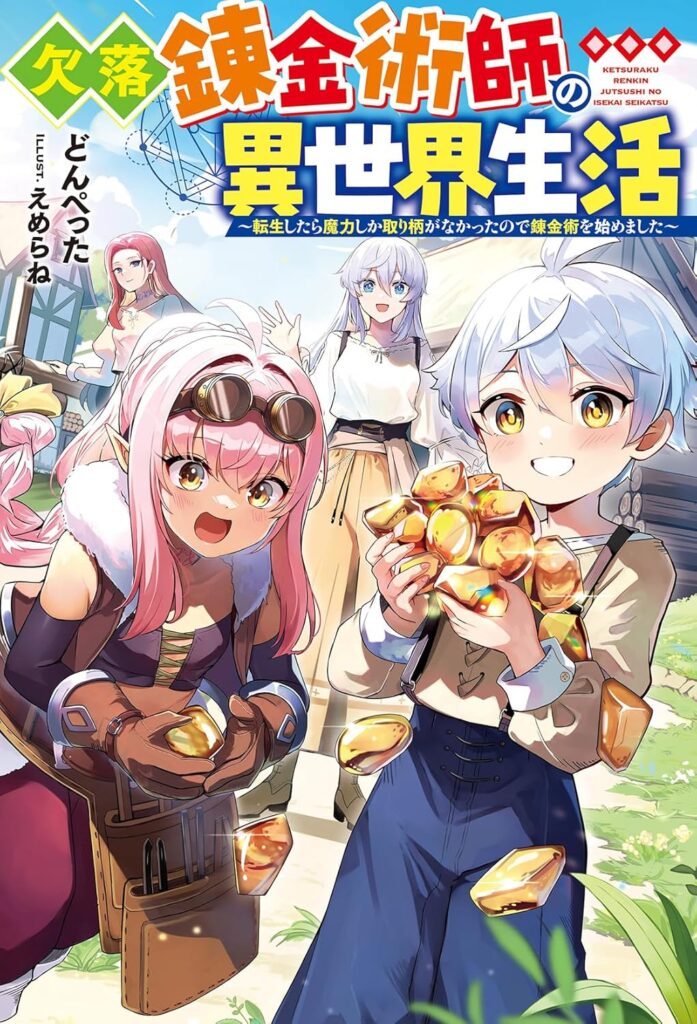
Kays Translations
Just another Isekai Lover~
Chapter 23: The Dinner Gathering
— At the Baron’s Residence —
When we returned to the baron’s mansion, Rosanne was already waiting for us at the entrance hall.
She wore a simple dress of pale spring green, embroidered only modestly along the hem. The soft color suited her perfectly. Seen like this, she looked like a delicate young maiden—someone who would smile shyly when spoken to, rather than a woman rumored to bear such a fearsome nickname.
“Rosanne… why are you here?” my mother asked, tilting her head slightly.
“Why, of course, I’ve been waiting for you, Oneesan,” Rosanne replied cheerfully, her voice light and innocent.
“…And how long have you been waiting?”
“Just a moment ago.”
Her answer was disarmingly pure, but I doubted it. Most likely, she had sensed Mother’s presence from afar—after all, that was something only Rosanne could do.
It sounded unbelievable even as I thought it, but rumor had it that her combat skill rivaled that of the Royal Guard Knights themselves. I didn’t really know what that meant in concrete terms, but if she was even stronger than Deidrick, then perhaps sensing a person’s aura was child’s play for her.
“I was waiting to invite you and young Al to dinner,” she continued, smiling with graceful poise. “It’s rather sudden, I know, but would you honor us with your presence?”
“We don’t have any formal wear with us,” Mother replied hesitantly. “Would that be a problem?”
Rosanne chuckled softly. “Not in the least. You are beautiful even without a gown, Oneesan. A dress could hardly make you more radiant.”
Mother fell silent for a moment, clearly torn, but after some thought, she nodded.
“…Very well. It will be a good experience for Arthur as well.”
“Thank you,” Rosanne said, bowing with elegance. “Once everything is prepared, I’ll have someone call for you. Until then, please rest in your room.”
— [Meluestat – Baron Merlot’s Mansion: Dining Hall] —
And so, somewhat unexpectedly, we found ourselves invited to dine with the Baron’s family that very evening.
Normally, as I later learned, a welcome dinner was held on the very first night guests arrived. But with the tragedy in Furnendorp and our sudden arrival to discuss the glass production venture, both Baron Tounis and his son Tobias had been overwhelmed with work. On top of that, Rosanne and Heilt had been away, so the formal dinner had been postponed.
Rosanne, however, upon hearing this from Julianna-sama, had insisted otherwise. “Being busy and being welcoming are two different things,” she had said firmly—then promptly arranged tonight’s gathering herself.
The dinner began with introductions.
Though I had already met Julianna-sama and little Marnix, it seemed that, by noble custom, introductions were to be done formally anyway.
The Merlot household consisted of six members: Baron Tounis and his wife, Julianna-sama; their eldest son Tobias and his wife, Rosanne; their infant son Marnix; and lastly, the Baron’s younger son Heilt, who was still away in Furnendorp.
Marnix, barely a year old, was present only for a brief greeting before being gently carried back to his room by a maid.
“To speak truth,” said Baron Tounis, placing a hand over his chest and bowing his head slightly, “though the disaster at Furnendorp fills me with grief, thanks to Martine-sama’s initiative in bringing us the proposal for the glass enterprise, we can now see a path toward reconstruction.”
As he bowed, so did the others in unison—a graceful, solemn gesture. Mother followed suit, lowering her head politely.
“Ordinarily, I would express gratitude directly to the alchemist who provided the vital information,” continued the Baron. “But to force one who prefers anonymity into the public eye would be discourteous. Even if our words never reach them, know that the House of Merlot offers its sincere thanks to that unknown alchemist—and likewise, to Martine-sama, for bringing that knowledge to us.”
Hearing that made me wince inwardly. It had all been a coincidence—an act of self-interest, even—and to be thanked so earnestly for it made my chest tighten with guilt.
“Now then, a toast,” the Baron declared.
Crystal glasses rose around the table, and thus began our dinner.
Beforehand, in our guest chamber, Mother had given me a crash course on table manners. Her main advice had been simple: do nothing that would make others uncomfortable.
In small formal dinners like this one, conversation and dining alternated politely. One ate quietly while food was served, and only after finishing a course did conversation resume—until the next dish arrived.
She had also explained the basic use of cutlery: start from the outermost utensils and work inward, and when finished, place the knife and fork neatly together on the lower right side of the plate. If I got confused, she said, just mimic her movements.
Dinner began with appetizers, followed by sliced bread and soup, then a beautifully sautéed fish dish. A small serving of chilled fruit was offered as a palate cleanser.
My portions were served in half size—mercifully so—and though I fumbled a few times, everyone smiled kindly and pretended not to notice. Somehow, I managed to get through without embarrassing myself.
The main course, I soon learned, was demon beef.
The name conjured up images of massive, savage creatures, but apparently, this breed was quite small and surprisingly swift—at least, for a cow.
“Martine-sama,” said Baron Tounis, setting down his glass, “I hear you intend to enroll young Arthur in the Academy for Nobles. But that school is meant for the aristocracy—hardly a place for commoners unconnected to politics or noble blood. May I ask why you wish for him to attend?”
Mother had already explained to me how the Academy worked: about twenty percent of the students were true nobles, another forty percent were from branch families who hadn’t inherited titles, twenty percent were children of newly ennobled families, and the last twenty percent were commoners like us—mostly training to become administrators serving noble households.
“My son wishes to study alchemy,” Mother answered calmly. “I only wish to grant that desire.”
“Alchemy?” The Baron’s brows lifted. “But doesn’t alchemy require an elemental attribute?”
Everyone’s gaze shifted toward me. I said nothing, focusing instead on cutting my meat quietly.
It had been served in small, tender pieces for my convenience, but I’d been watching Mother’s movements so closely that I started eating late, and it was hard to cut without making noise.
“In truth,” Mother said after a pause, “the alchemy texts never mentioned that an attribute was strictly necessary.”
“But to create alchemical potions, one must use water and several other attributes, mustn’t one?”
“That’s true—if one intends to make potions. But if alchemy is applied in other ways—such as in the glass industry—then no attribute seems to be required.”
In the book Introduction to Alchemy, which Mother had given me, it said: ‘Alchemy is the art of imbuing elemental properties into materials and synthesizing them into new forms.’ However, beyond that single passage, there was no mention of attributes anywhere. I had realized then that, in most applications, attributes weren’t used at all.
“I see,” said the Baron thoughtfully. “And that information, too, came from your mysterious alchemist friend?”
Mother smiled faintly. “I’ll leave that to your imagination.”
She couldn’t very well tell him the truth; the story she’d woven was already growing fragile at the seams.
“Also,” she added softly, “though Arthur has no elemental attribute, he does possess mana. I believe that, even without attributes, he can become a fine alchemist.”
Hearing her say that made my chest tighten with both embarrassment and pride.
“As expected of my Oneesan,” Rosanne said, her eyes shining. “Your devotion to young Al is truly beautiful.”
“Rosanne,” said Julianna-sama, smiling wryly, “you have Marnix. You should love your own child just as deeply as Martine-sama loves hers.”
“Mother,” Rosanne replied without hesitation, “I do love little Marl with all my heart. I intend to raise him into a swordsman greater than myself!”
Greater than her? That would mean becoming a Royal Guard Knight—no small dream for a child barely learning to walk.
“Rose,” Tobias said with a weary smile, “Marnix is the heir. He doesn’t need to be as strong as you.”
“Indeed,” the Baron agreed, shaking his head. “As much as I admire your spirit, Rosanne, what he truly needs is skill in governance. The people would suffer if their lord thought only of swords.”
Both men were clearly trying to redirect her ambitions.
I didn’t know what kind of training Rosanne did, but judging by their exasperated tones, it must have been… extreme. Given her habit of ignoring advice, I could already imagine little Marnix’s future filled with grueling days.
Yes… may fortune—and strength—be with you, young Marnix. You’ll need both.
